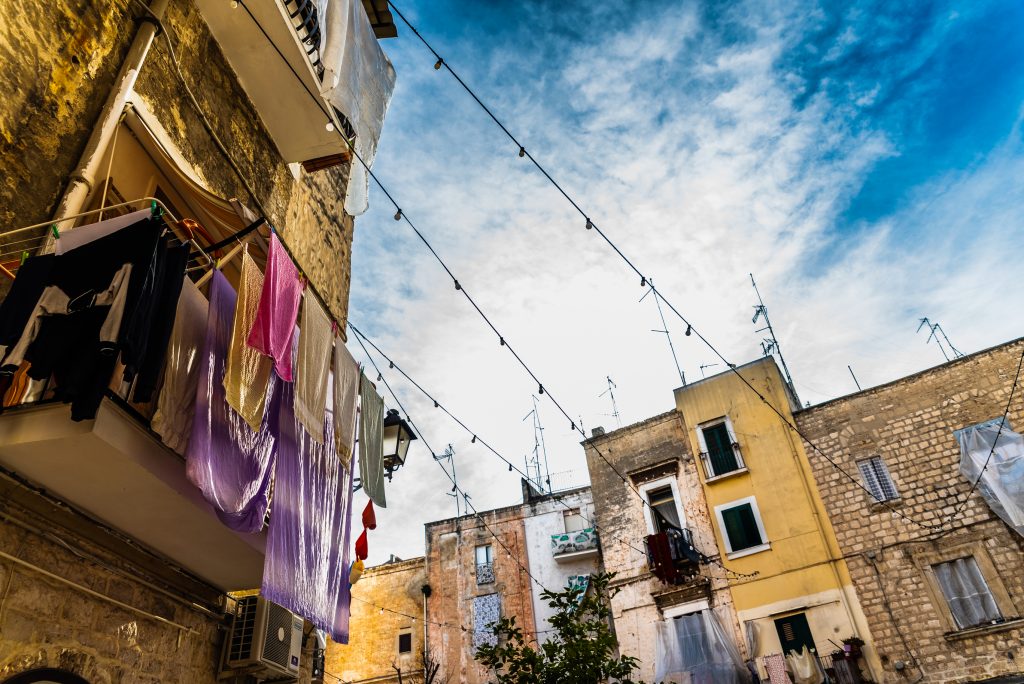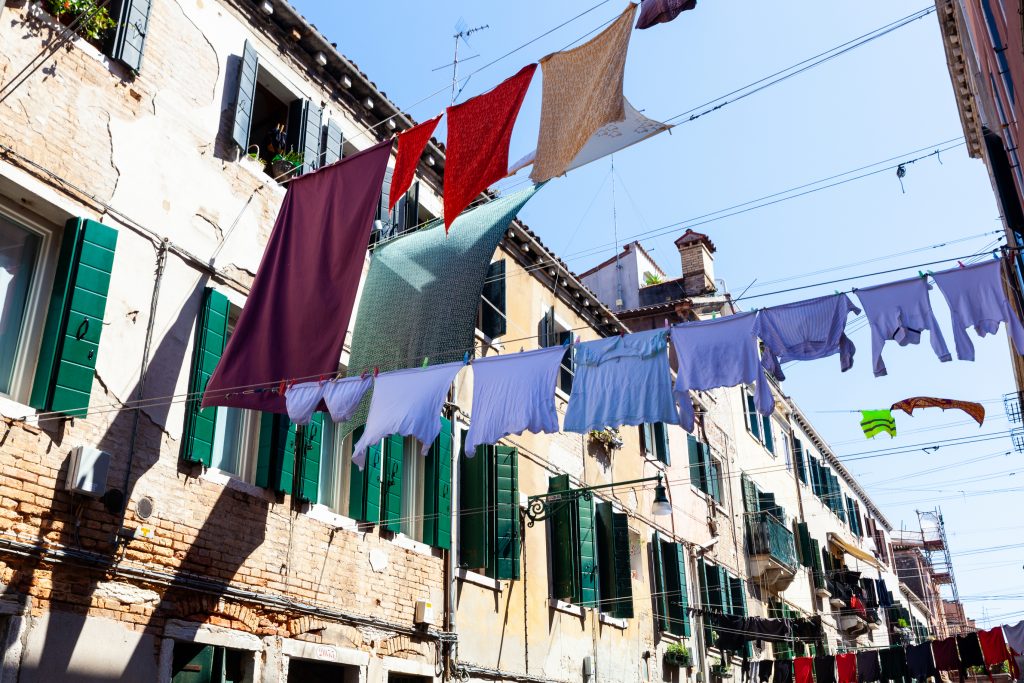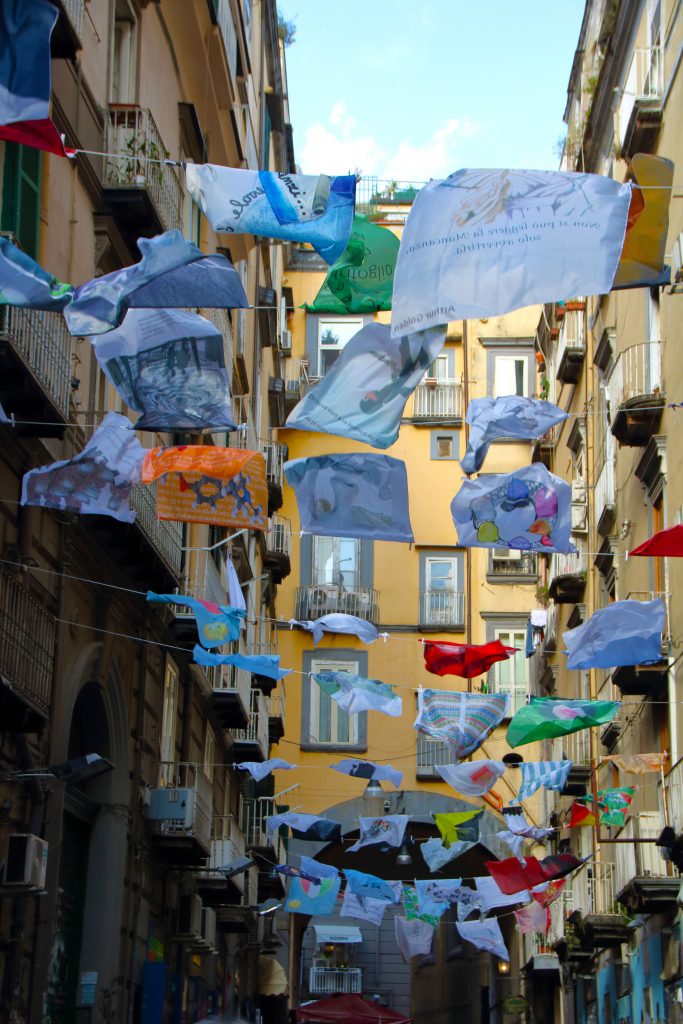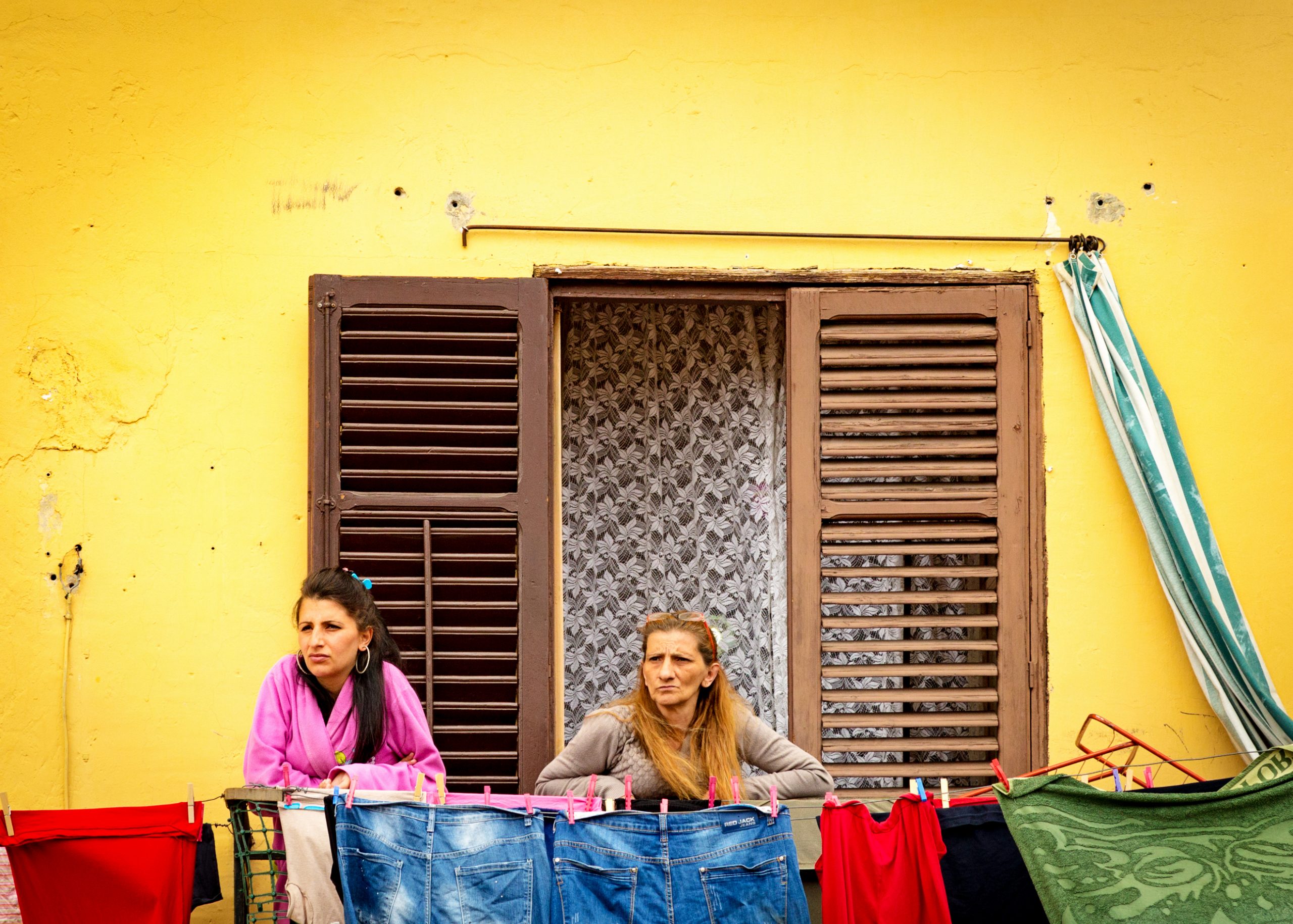Not many countries in the world make of their clean laundry a street decoration, but Italy does. From Venice to Florence, from Naples to Bozen, lines of blues and reds, browns and yellows and greens and whites, all hang out of our windows like a fragrant rainbow of normality, and god only knows how much we need that, nowadays.
Have you ever wondered how much you can learn about the people living in a place from what hangs outside their windows? How many they are, their gender, if there are children. Their favorite soccer team, the style of their décor and even their nationality. During the summer, when you start seeing bathing suits and beach towels, you realize who’s been on holiday and who still has to take a well deserved rest by the sea.
If you look carefully, you can imagine outfits, even people ’s daily routines and their jobs.

It’s not peeping, mind. It’s getting to know your neighborhood, learning to love a place, discovering the quirky ways of a country. You see, there is art in this, too.
There is art in the way clothes lines join together windows and buildings, linking rooms of the same house and houses of the same street. They are the sturdy connection between families, ante litteram phone wires, along which mothers, sisters and wives talked to one another and created a vicinato. There is art in this myriad of shapes, textures and colors blessing old houses and decrepit buildings, beautiful residences and traditional homes, but also bleak council estates, and boroughs where you smell poverty as if it were made of glue. Because that laundry outside the window speaks of hope, too: hope to grow up, make it to college and get out of a bad neighborhood; hope to travel the world and finally break free from the narrow boundaries of a city’s outskirts; hope life can get better.
In those clothes out in the air, you’ll find plenty of magic, too.
When the wind blows, fabrics and colors move as if on a stage: it’s a theatre representation, a hide and seek performance of cotton and wool, silk and linen, whites and neons. Light and shadow play above your head, with sheets masking the sun and their shadows changing the way the ground under your feet looks. And don’t forget the sounds: that muted note of cotton being whipped around, the same you used to make when, as a child, you’d use a towel as a toy. The squeaky noise of clothes lines being pulled, the clicking of cloth pegs being collected: what a commonly beautiful symphony of — remember the word — normality.

But, as it is often the case when I write or eat a slice of cake, I like to leave the best for last. And the best of that laundry hung outside to dry is its scent. Fresh laundry scent is the epitome of cleanliness, of home, of peace. It means everything is, as an old Radiohead song says, “in the right place,” that you’re ready for whatever is coming your way. Fresh laundry is also the scent of memories and it doesn’t matter where you come from or how old you are: it remains the scent of our parents and grandparents doing chores, of that first few seconds after getting into a clean bed you didn’t have to change yourself.
And then, you know how the old saying goes: laundry that dries outside smells like the sun.
By the way, did you know there is, in fact, a scientific reason behind this and that it’s an Italian scientist who discovered it? Silvia Pugliese, who works for the university of Copenhagen and had the results of her study recently published on the Environmental Chemistry journal, found out that laundry that dries in open air produces a large quantity of aldehydes and ketones, organic molecules also produced by plants and flowers. Apparently, exposure to ozone and ultraviolet rays contributes to the transformation of common chemicals into these organic wonders that make everything they come in contact with smell nice. You see, the magic of science — what a beautiful oxymoron! — plays with us, too.
Sometimes, the message is just as powerful when the laundry isn’t out to dry. Just like when you are used to see an old lady’s flowery dresses and silk stockings hanging everyday just up there, in the corner of your village’s square and then, one strange morning, one morning that felt a tad colder than all others, you notice they are no longer there. And then, the church’s bell tolls and you know another soul moved on to a better place, even higher up in the sky than those clothes lines.
If you grow up in a country where the laundry dries inside, in a tumble dryer or in the privacy of a back garden — where all the poetry of its presence is kept, as a well guarded secret, behind closed doors — you may not understand why we Italians, sometimes, miss the colorful and apparent chaos of our laundry hanging out. But if you were born here, it’s a different story. You miss it, when you live away. You miss it because it tells you a thousand tales about the place you live in and the life of those around you; about nature and love, about families and solitude, about life, death and what lies beyond.

Would you have ever imagined it was all there, cherished within those white sheets and crimson gowns, gently and unassumingly hanging just above your head?
Not many countries in the world make of their clean laundry a street decoration, but Italy does. From Venice to Florence, from Naples to Bozen, lines of blues and reds, browns and yellows and greens and whites, all hang out of our windows like a fragrant rainbow of normality, and god only knows how much we need that, nowadays.
Have you ever wondered how much you can learn about the people living in a place from what hangs outside their windows? How many they are, their gender, if there are children. Their favorite soccer team, the style of their décor and even their nationality. During the summer, when you start seeing bathing suits and beach towels, you realize who’s been on holiday and who still has to take a well deserved rest by the sea.
If you look carefully, you can imagine outfits, even people ’s daily routines and their jobs.
It’s not peeping, mind. It’s getting to know your neighborhood, learning to love a place, discovering the quirky ways of a country. You see, there is art in this, too.
There is art in the way clothes lines join together windows and buildings, linking rooms of the same house and houses of the same street. They are the sturdy connection between families, ante litteram phone wires, along which mothers, sisters and wives talked to one another and created a vicinato. There is art in this myriad of shapes, textures and colors blessing old houses and decrepit buildings, beautiful residences and traditional homes, but also bleak council estates, and boroughs where you smell poverty as if it were made of glue. Because that laundry outside the window speaks of hope, too: hope to grow up, make it to college and get out of a bad neighborhood; hope to travel the world and finally break free from the narrow boundaries of a city’s outskirts; hope life can get better.
In those clothes out in the air, you’ll find plenty of magic, too.
When the wind blows, fabrics and colors move as if on a stage: it’s a theatre representation, a hide and seek performance of cotton and wool, silk and linen, whites and neons. Light and shadow play above your head, with sheets masking the sun and their shadows changing the way the ground under your feet looks. And don’t forget the sounds: that muted note of cotton being whipped around, the same you used to make when, as a child, you’d use a towel as a toy. The squeaky noise of clothes lines being pulled, the clicking of cloth pegs being collected: what a commonly beautiful symphony of — remember the word — normality.
But, as it is often the case when I write or eat a slice of cake, I like to leave the best for last. And the best of that laundry hung outside to dry is its scent. Fresh laundry scent is the epitome of cleanliness, of home, of peace. It means everything is, as an old Radiohead song says, “in the right place,” that you’re ready for whatever is coming your way. Fresh laundry is also the scent of memories and it doesn’t matter where you come from or how old you are: it remains the scent of our parents and grandparents doing chores, of that first few seconds after getting into a clean bed you didn’t have to change yourself.
And then, you know how the old saying goes: laundry that dries outside smells like the sun.
By the way, did you know there is, in fact, a scientific reason behind this and that it’s an Italian scientist who discovered it? Silvia Pugliese, who works for the university of Copenhagen and had the results of her study recently published on the Environmental Chemistry journal, found out that laundry that dries in open air produces a large quantity of aldehydes and ketones, organic molecules also produced by plants and flowers. Apparently, exposure to ozone and ultraviolet rays contributes to the transformation of common chemicals into these organic wonders that make everything they come in contact with smell nice. You see, the magic of science — what a beautiful oxymoron! — plays with us, too.
Sometimes, the message is just as powerful when the laundry isn’t out to dry. Just like when you are used to see an old lady’s flowery dresses and silk stockings hanging everyday just up there, in the corner of your village’s square and then, one strange morning, one morning that felt a tad colder than all others, you notice they are no longer there. And then, the church’s bell tolls and you know another soul moved on to a better place, even higher up in the sky than those clothes lines.
If you grow up in a country where the laundry dries inside, in a tumble dryer or in the privacy of a back garden — where all the poetry of its presence is kept, as a well guarded secret, behind closed doors — you may not understand why we Italians, sometimes, miss the colorful and apparent chaos of our laundry hanging out. But if you were born here, it’s a different story. You miss it, when you live away. You miss it because it tells you a thousand tales about the place you live in and the life of those around you; about nature and love, about families and solitude, about life, death and what lies beyond.
Would you have ever imagined it was all there, cherished within those white sheets and crimson gowns, gently and unassumingly hanging just above your head?





























